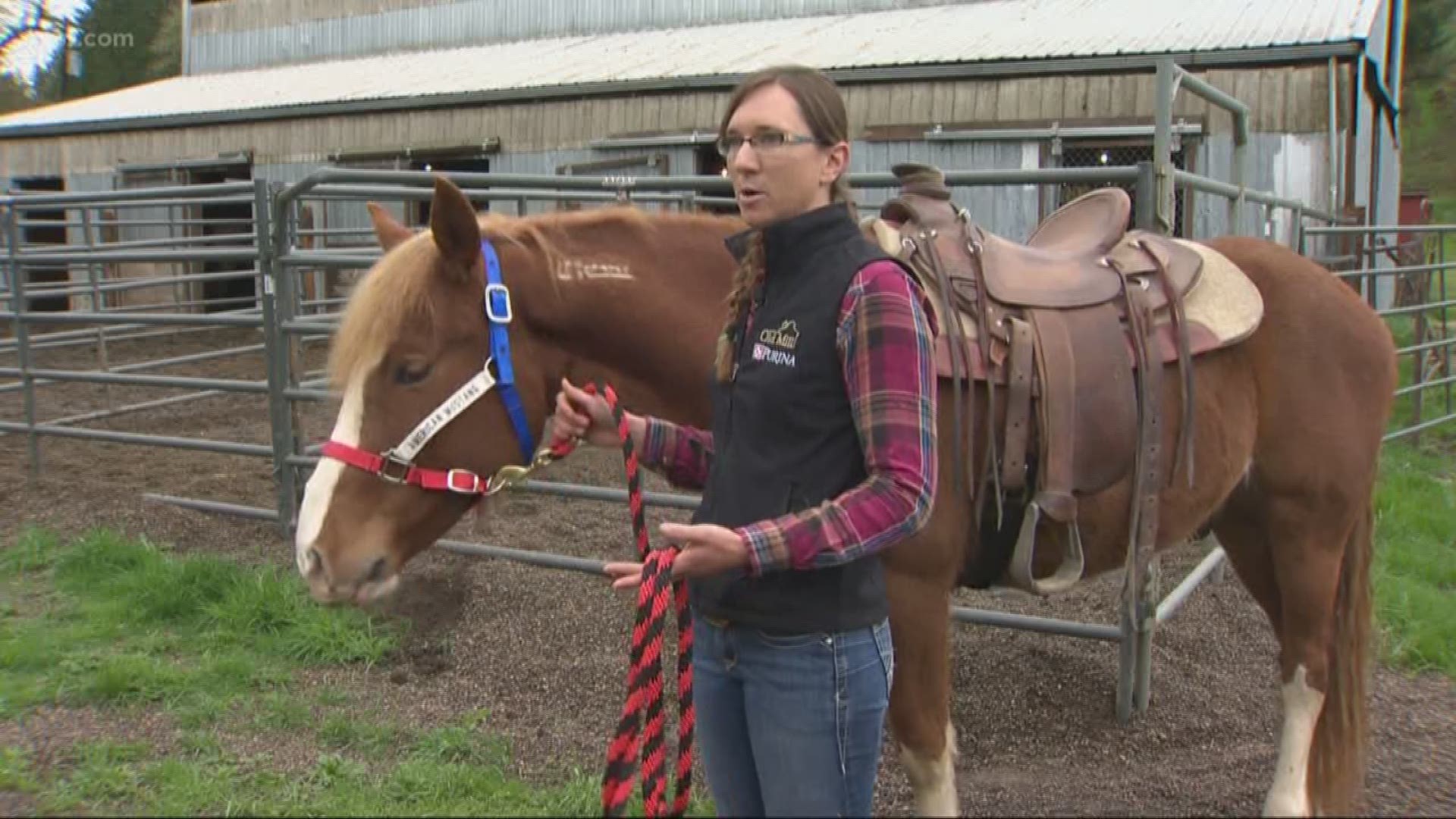GASTON, Ore. — The number of wild horses in the United States is so large that these animals can no longer thrive. There are about 80,000 wild horses and burros across the country, but that’s more than 50,000 too many, according to data from the Bureau of Land Management.
As the population continues to grow and resources are thin, Oregon horse trainer Rachel Tarnowski fears these animals face an uncertain future of starvation and possible slaughter.
Among the cows, goats, and sheep at Ox Hill Homestead in Gaston you will find Tarnowski living her passion – by training wild mustangs.
“I'm just doing what I can for each horse,” she said.
Tarnowski has been working with horses nearly all her life and has focused her skills on wild mustangs and burros for nearly a decade.
On Friday, she brought her latest round of trainees to her ranch – three geldings from the Warm Springs Herd Management Area, southeast of Portland. Through her calm and steady training, the trio of otherwise corralled horses will be ready for adoption.
“My whole purpose in my gentling techniques is to keep it as low key as possible. I don't want to stress the animal out,” Tarnowski said.
Gentling is the beginning process of taming these wild horses. The goal is to get them comfortable with their new surroundings, halters, and handlers.
She does this through the Mustang Heritage Foundation's Trainer Incentive Program, better known as TIP. The program’s goal is to connect wild horses with people through training and adoption.
“Their mission being to get mustangs out of the corrals and be able to find them homes,” Tarnowski said. “And the best way we've found is to give these horses at least basic handling and gentling skills.”
TIP coincides with BLM’s efforts to confront the over-population of wild horses and burros, which cost taxpayers nearly $50 million every year to maintain, according to BLM.
“We are starting to see the effects of having too many of these wild horses roaming the range and now sitting in holding,” Tarnowski said.
Without a number of programs in place to find wild horses sustainable homes in the public, Tarnowski says herds face starvation and draught. There is a renewed possibility of bringing back slaughter houses in the U.S. to deal with herd management, according to Tarnowski.
“With that push happening and numbers of unwanted horses increasing we are seeing a need to step up and place these particular horses into private care so that down the road something like that doesn't happen to these mustangs,” Tarnowski said.
While there are financial incentives for trainers in TIP, Tarnowski says the financial benefits are greatly diminished by the cost of caring for and transporting the animals during training. She says readying these animals for adoption and finding them homes is a true labor of love.
Tarnowski has a stall door in her stable covered in tags, each from a mustang that she has helped train. There are dozens on display, but it only represents about a third of them. She says she's worked with more than 100 wild horses and burros the past seven years.
“Trying my best to get myself out there to help as many horses as possible,” Tarnowski said.
She doesn't name the horses because she wants their eventual owners to have that privilege. She made an exception for one mustang, Nick’s Valor, who stood beside her during our interview. After years of training wild mustangs, Tarnowski decided to keep him as her own.
“This guy kind of stole my heart and it was time for me to call him mine,” she said. “I think he's a good representation of a nice-looking mustang and one that's willing to be a partner to people as a useful riding horse.”
It takes nerves of steel and a deep understanding of horses to do what Tarnowski does.
“If I can step up and add value to a horse through training, then that's what I can say that is the most rewarding part for me. Hopefully I can make an impact on as many horses as I can to find them homes,” Tarnowski said.
Tarnowski’s training is just the first step for these mustangs. Before they’re able to be adopted they must be able to use a halter.
Adopting a wild mustang is not for everyone. There is an application process and requirements. Not only do those looking to take in these horses need to have the proper facilities and resources to care for them, but they also need to be able to commit time to training and loving these majestic animals, according to Tarnowski.
There is a whole network of people in the region Tarnowski works with to save wild mustangs. That includes Happy Heart Acres in Scappoose, Oregon.
Tarnowski is always looking for interested adopters to help find her horses a good home. Check out her Facebook page for the horses who are ready to be adopted right now.

